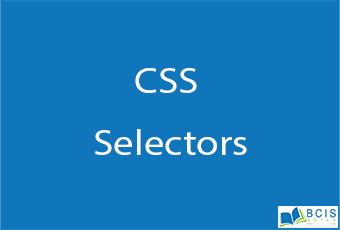
CSS Selectors
CSS selectors define the elements to which a set of CSS rules apply.
They are used to select the content you want to style. Selectors are the part of CSS ruleset. CSS selectors select HTML elements according to their id, class, type, attribute, etc.
There are five types of selectors, they are:
- CSS Universal Selector
- CSS Element Selector
- CSS Class Selector
- CSS ID Selector
- CSS Group Selector
- 1. Universal selector
- It selects all elements on the pages. Optionally, it may be restricted to a specific namespace or to all namespaces.
- Syntax:
*
Example:*will match all the elements of the document. 
- 2. Element selector
- It selects all elements that have the given node name.
Syntax:elementname
Example:inputwill match any<input>element. 
- 3. Class selector
- It selects all elements that have the given
classattribute.
Syntax:.classname
Example:.indexwill match any element that has a class of “index”. 
- 4. ID selector
- It selects an element based on the value of its
idattribute. There should be only one element with a given ID in a document.
Syntax:#idname
Example:#tocwill match the element that has the ID “toc”. 
- 5. Group selector
- The grouping selector is used to select all the elements with the same style definitions. Grouping selector is used to minimizing the code. Commas are used to separate each selector in a grouping.Syntax: elementname, elementname, elementname
Example: h1, h2, p will match all elements that have the h1, h2, p element name. (to any value).
If you liked our content CSS Selectors, then you will also like Introduction to CSS


Leave a Reply